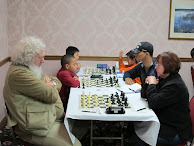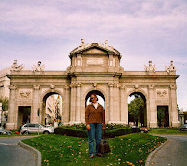Sunday, October 19, 2008
China Trying to Calm the Restive Provinces
In addition to clamping down - hard - on the Muslims within the "autonomous regions", China has enacted "land reform." Yeah - right. Let's see how far this reform is implemented in the face of totally corrupt local bureaucracies that the central government continues to do absolutely nothing about:
China Enacts Major Land-Use Reform
By JIM YARDLEY
Published: October 19, 2008
BEIJING — After days of uncertainty, the governing Communist Party on Sunday announced a rural reform policy that for the first time would allow farmers to lease or transfer land-use rights, a step that advocates say would raise lagging incomes in the Chinese countryside.
The new policy, announced by Chinese state media, is a major economic reform and is also rich in historical resonance, coinciding with the 30th anniversary of the land reforms enacted by the Chinese leader Deng Xiaoping, which were considered the first critical steps in the policies that have fueled China’s rapid economic growth.
For President Hu Jintao, whose tenure has disappointed some reformers, the new policy seems intended to position him as a worthy heir to Deng.
“The new measures adopted are seen by economists as a major breakthrough in land reforms initiated by late leader Deng Xiaoping 30 years ago,” reported Xinhua, the country’s official news agency.
Under the current system, farmers are assigned small plots of land. Under the new policy, the government will establish markets where farmers can “subcontract, lease, exchange or swap” land-use rights or join cooperatives. Reform advocates say allowing leasing or transfer would enable the creation of larger, more efficient farms that could increase output.
The fate of the reform program has been uncertain for the past week. Analysts had expected an announcement last Sunday after the conclusion of an important annual Communist Party planning session. But the communiqué released after the meeting made no mention of land reform, fueling speculation that opponents may have derailed the plan.
Critics had warned that weakening the existing system of collective village ownership could deprive peasants of the security of having a piece of land and possibly lead to millions of landless farmers. [Well, duh! Of course it will, darlings!] But the existing system has become rife with corruption, as local officials and developers have illegally seized farmland for urban expansion while paying minimal compensation to farmers.
Signs that the reforms had been approved began to appear during the week. In Chengdu, the capital of the southwestern Sichuan Province, a government land market opened last Monday. On Thursday, a leading Communist Party magazine published an article by one of the country’s most senior officials on rural issues in which he said that the party would create a market for transferring land-use rights in the countryside.
Deng’s reforms broke up the collective use, if not ownership, of land and created a household registration system that assigned land to individual families to use as they saw fit. Those reforms enabled farm incomes to rise sharply during the early 1980s, even as city dwellers suffered.
But the later creation of an urban real estate market saw an explosion of wealth in the cities that contributed to a sharp income divide between increasingly affluent city dwellers and impoverished peasants. In recent years, rural protests have become increasingly common as disgruntled farmers have demonstrated against illegal land grabs or corrupt local officials. At the same time, tens of millions of farmers have flocked to cities in search of work, leaving plots of land to be tended by their elderly parents.
Reducing the rural-urban income gap has been a major priority for Mr. Hu, but the gap has continued to widen in recent years, as China has become one of the most unequal societies in the world. On Sunday, Xinhua also announced the party’s intention to establish a modern rural financial system to extend more credit and investment into the countryside. Chinese banking regulators have been ordered to establish 40 more rural banking institutions by year’s end.
Increasing incomes in the countryside is a major part of the government’s effort to raise China’s domestic consumption at a time when the overall economy is slowing. More than 700 million people are still designated as rural inhabitants, yet their spending is minimal. [Well, duh again! That's because they don't have the money to spend, nim-nuts!] Economists say that jump-starting the rural economy is one way to offset the possibility of a recession, as exports are expected to slow because of the global financial crisis. [Yeah, right. Good luck with that.]
Huang Yuanxi contributed research.
Subscribe to:
Post Comments (Atom)



































No comments:
Post a Comment